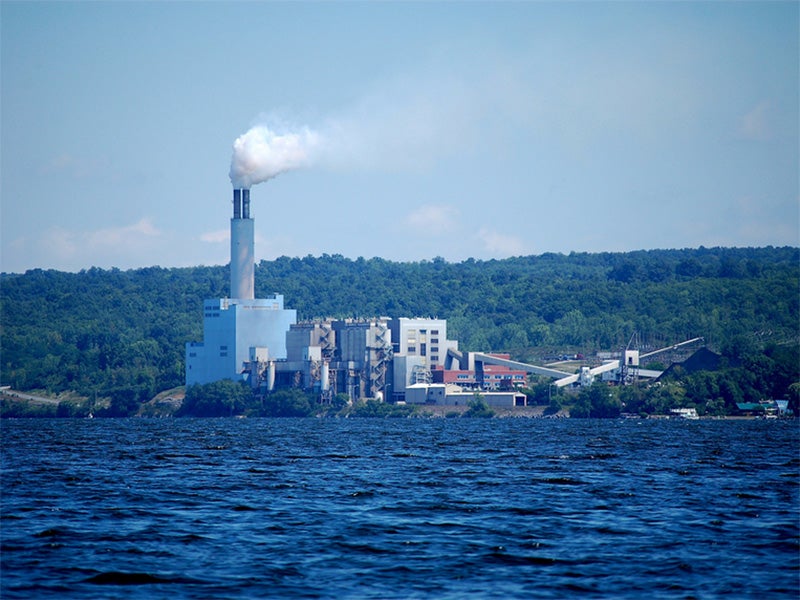Elected Officials, Ratepayers Press Cuomo on Controversial Power Plant Proposal
A ratepayer-subsidized bailout for a dying coal plant could total $100 million
Local elected officials, ratepayers and students traveled to Albany today to press Gov. Andrew Cuomo on a controversial proposal to bail out a dying coal plant in the Finger Lakes region.
Opponents of the conversion—including a coalition of manufacturing, renewable energy and other leaders—are also concerned about rate hikes and are pushing for cheaper, cleaner grid upgrades.
At issue is whether to keep the Cayuga Power plant in Tompkins County functioning by converting the plant to natural gas, despite the plant operator and regional utility’s initial plans to mothball the uneconomic plant. If approved, it could continue a troubling trend in which Governor Cuomo is undermining his own energy goals by allowing ratepayer subsidies for dying fossil fuel plants, like the Dunkirk Power Plant in Western New York, or the Danskammer coal plant in the Hudson Valley.
The cost of the Cayuga plant conversion could stretch to almost $100 million—according to an economic impact analysis from Tomkins County Area Development. Meanwhile, the regional utility New York State Electric and Gas (NYSEG) has said simple upgrades to regional transmission lines would ensure energy reliability needs—at a quarter of the cost to its ratepayers.
Earlier this year, Gov. Cuomo’s Public Service Commission (PSC) gave Cayuga Operating Company a Dec. 1 deadline to submit a formal proposal to convert the plant to natural gas. November 13 was the final PSC meeting before Cayuga’s December 1 deadline.
To demonstrate mounting objections to the plan, opponents attended today’s PSC meeting to remind commissioners of their objections to the plan, organized a parallel call-in day to the governor, took out a full-page ad on the issue, and help a press conference on this issue and dramatized the state’s impending decision with a short skit performed outside the Governor’s office.
"Investing in transmission lines is an investment in the future. Converting the Cayuga plant to gas would keep us tied to using fossil fuels for the foreseeable future," said Tompkins County Legislator Carol Chock, "We can either reach the environmental goals of our county, New York State, and indeed, the world—or we can prop up fossil fuel infrastructure—but we can’t do both."
In addition to the cost, local opponents are concerned that the conversion would lead to increased fracking for natural gas, undermine renewable energy investments, and hurt efforts to address climate change.
"Bailing out an unneeded fossil fuel plant undermines all of our hard work to build our region’s renewable energy economy. On the other hand, simple transmission line upgrades would multiply our successes making sure our grid is efficiently using this clean renewable power," said Solarize Tompkins member Marie McRae.
Residents and officials from Dryden, NY—the community that won a landmark court case this spring upholding the right of New York municipalities to ban fracking—were among those participating in the events. The town of Dryden could be impacted by this plan.
"We know how dangerous fracking is and we refuse to ask other communities to bear the environmental costs of this practice. The good news is: we don’t have to. Our regional utility, NYSEG, has said that we can easily meet any energy needs connected to closing the Cayuga plant by making some simple upgrades to our transmission grid—for a quarter of the cost of plant conversion," said Dryden Town Board member Linda Lavine.
"The choice between the costly and polluting bailout of Cayuga and affordable and environmentally benign transmission upgrades is really a no-brainer," said Earthjustice Associate Attorney Moneen Nasmith. "New York cannot credibly claim to be a leader in renewable energy while propping up fossil fuel plants."

Additional Resources
About Earthjustice
Earthjustice is the premier nonprofit environmental law organization. We wield the power of law and the strength of partnership to protect people's health, to preserve magnificent places and wildlife, to advance clean energy, and to combat climate change. We are here because the earth needs a good lawyer.